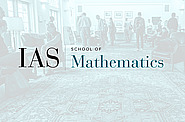Seminars Sorted by Series
Short Talks by Postdoctoral Members
Sep
27
2004
Short Talks by Postdoctoral Members
Singularities of Variations of Mixed Hodge Structure
Gregory Pearlstein
2:00pm|S-101
Sep
27
2004
Sep
28
2004
Short Talks by Postdoctoral Members
Transfer of Generic Automorphic Representations to GL(N)
2:00pm|S-101
Sep
28
2004
Short Talks by Postdoctoral Members
Mirkovic-Vilonen Polytopes and Polynomials
Jared Anderson
2:00pm|S-101
Sep
28
2004
Short Talks by Postdoctoral Members
Modular Symbols and Existense of Maass Cusp Forms
Morten Risager
2:00pm|S-101
Sep
28
2004
Short Talks by Postdoctoral Members
Computing Combinatorial Invariants from Representation Theory
2:00pm|S-101
Sep
28
2004
Sep
28
2004
Sep
29
2004
Short Talks by Postdoctoral Members
Global Well-Posedness for the Klein-Gordon-Schrödinger System in Low Dimensions Below the Energy Space
2:00pm|S-101
Sep
29
2004
Short Talks by Postdoctoral Members
Instabilities for NLS Equations with a Periodic Potential
2:00pm|S-101
Sep
29
2004
Short Talks by Postdoctoral Members
On Some Conformally Invariant Fully Nonlinear Equations
2:00pm|S-101
Sep
29
2004
Short Talks by Postdoctoral Members
The Hilbert Transform Along C^{1+\epsilon} Vector Field
2:00pm|S-101
Oct
04
2004
Oct
04
2004
Oct
04
2004
Oct
04
2004
Short Talks by Postdoctoral Members
Multidimensional Schrodinger Operators with Slowly decaying and Random Potentials
2:00pm|S-101
Oct
05
2004
Short Talks by Postdoctoral Members
Some Conjectures on Noise-Stability with Applications to Computer-Science
2:00pm|S-101
Oct
05
2004
Short Talks by Postdoctoral Members
The Slicing Problem and Geometric Symmetrization Methods
2:00pm|S-101
Oct
05
2004
Oct
05
2004
Short Talks by Postdoctoral Members
How a Theorem of A. A. Markov's Younger Brother Tells Us a Limitation of Quantum Advisors
2:00pm|S-101
Oct
05
2004
Oct
05
2004
Oct
05
2004
Oct
03
2005
Short Talks by Postdoctoral Members
On the Relation Between Worst-Case and Average-Case Complexity for NP
2:00pm|S-101
Oct
03
2005
Oct
03
2005
Oct
03
2005
Oct
04
2005
Short Talks by Postdoctoral Members
Computing Cohomology of pro-p Groups Using Lie Algebra Methods
2:00pm|S-101
Oct
04
2005
Short Talks by Postdoctoral Members
Deformed Harish-Chandra Homorphism for the Cyclic Quiver
2:00pm|S-101
Oct
04
2005
Oct
04
2005
Oct
04
2005
Oct
05
2005
Oct
05
2005
Short Talks by Postdoctoral Members
Lyapunov Exponent and Integrated Density of States for Schrödinger Cocycles
2:00pm|S-101
Oct
06
2005
Short Talks by Postdoctoral Members
Some Applications of the Pseudo-Randomness of Expander Graphs
2:00pm|S-101
Oct
06
2005
Short Talks by Postdoctoral Members
Adding Interactions to a Random Schrödinger Equation
2:00pm|S-101
Oct
06
2005
Oct
06
2005
Short Talks by Postdoctoral Members
An Analytic Approach to Combinatorics
Balasz Szegedy
4:00pm|S-101
Oct
06
2005
Oct
06
2005
Short Talks by Postdoctoral Members
Pl and Representable Algebras: Decidable and Undecidable Problems
4:00pm|S-101
Oct
07
2005
Short Talks by Postdoctoral Members
Bounded Cohomology and the Geometry of Representations
3:30pm|S-101
Oct
07
2005
Short Talks by Postdoctoral Members
Solution of Shannon's Problem on the Monotonicity of Entropy
Shiri Artstein
3:30pm|S-101
Oct
07
2005
Short Talks by Postdoctoral Members
Bounds for the Number of Integral or Rational Points on Varieties
3:30pm|S-101
